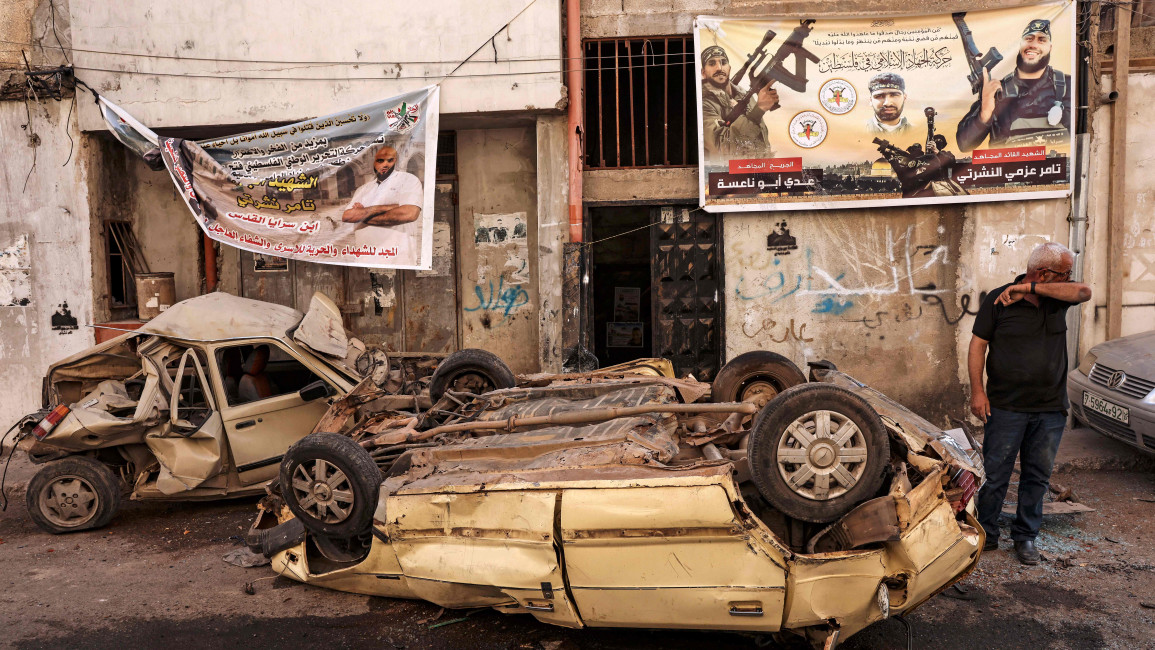
In Palestine, Jenin refugee camp is a symbol of resistance and community
This week, the refugee camp of Jenin and its surrounding area in the northern West Bank faced a two-day invasion by Israeli regime forces.
In less than half a square kilometre, the densely packed camp houses over 23,000 refugees, who mostly originate from the Haifa area and were expelled during the Nakba of 1948.
Reminiscent of the invasion of the camp in 2002 during the Second Intifada, the Israeli regime’s most recent deadly invasion began with Israeli bulldozers tearing up roads - a deliberate tactic to make it difficult for people to leave.
The camp was then subjected to missile attacks and a ground force invasion. Many had to flee on foot, carrying the injured with them as ambulances couldn’t reach the wounded. Israeli soldiers even shot at the Jenin hospital.
"Despite claiming a successful operation, the Israeli regime did not wipe out the resistance in Jenin nor anywhere else. For Palestinians, so long as the Israeli regime continues to colonise us and our land, we will resist. It is a simple equation"
In addition to the mass destruction of infrastructure, at least 12 Palestinians were killed, including four children, while many hundreds were injured and thousands had to flee their homes.
Jenin refugee camp, which has long been a site and symbol of resistance to Zionist colonisation, is the target of systematic attacks by the Israeli regime, but this invasion was a serious escalation.
Israeli propaganda fed a narrative to international media that the pretext for this invasion was to wipe out a “terrorist command hub” in the camp. Using this kind of language is a well rehearsed dehumanising tactic that preemptively tries to justify mass casualties and the use of lethal force.
At the very same time, Israeli army generals were publicly stating in Hebrew that this particular military assault was about cementing total Israeli control over the northern West Bank in order to make way for expanding illegal settlements and to allow Israeli settlers free reign.
Israeli forces launched drone strikes in the occupied West Bank city of Jenin for the second time in less than two weeks yesterday, as part of an operation that set off a gunbattle and killed at least 10 Palestinians
— The New Arab (@The_NewArab) July 4, 2023
🎥: @alexander_durie pic.twitter.com/4F79s7YZ8l
Some Palestinian analysts have pointed out that the Israeli regime's strategy towards Jenin is the same as the “mowing the lawn” doctrine used in Gaza. This refers to Israel’s tactic of routinely causing excessive destruction in a particular area in an attempt to crush the capabilities of and support for Palestinian resistance.
Whilst the material consequences of this military strategy are absolutely horrific - the humanitarian crisis in Gaza is testament to this - it still fundamentally fails to weaken Palestinian resistance.
Indeed, despite claiming a successful operation, the Israeli regime did not wipe out the resistance in Jenin nor anywhere else. For Palestinians, so long as the Israeli regime continues to colonise us and our land, we will resist. It is a simple equation.
Amidst the violence and destruction inflicted upon the camp throughout the invasion, we saw beautiful practices of community care. Palestinians in Jenin opened their doors to those who were fleeing their homes.
They fed Palestinian journalists who were on the ground reporting for days and who faced the same potential fate as Shireen Abu Akleh- the Palestinian journalist who was killed last year in Jenin. Some who fled their homes left notes for those who stayed behind to defend the camp, instructing them of where food supplies were and of escape routes.
Even in the aftermath, the camp community has come together to clear the rubble and to rebuild homes and infrastructure. Palestinians in other parts of the West Bank and in the ‘48 territories have been gathering supplies to take to the camp.
They face a formidable task- a Palestinian Authority (PA) committee estimated that reconstruction will cost over $15.5 million, but local residents say this is an underestimation. This will all have to be rebuilt without reliable access to electricity and clean drinking water, as a result of the deliberate damage caused by Israeli regime forces.
Yet among all the destruction and obstacles, what remains abundantly clear is that the spirit of resistance and community in the camp has not been broken.
Yara Hawari is the Senior Analyst of Al-Shabaka, the Palestinian Policy Network.
Follow her on Twitter: @yarahawari
Have questions or comments? Email us at: editorial-english@newarab.com
Opinions expressed in this article remain those of the author and do not necessarily represent those of The New Arab, its editorial board or staff.


![President Pezeshkian has denounced Israel's attacks on Lebanon [Getty]](/sites/default/files/styles/image_684x385/public/2173482924.jpeg?h=a5f2f23a&itok=q3evVtko)



 Follow the Middle East's top stories in English at The New Arab on Google News
Follow the Middle East's top stories in English at The New Arab on Google News


